- Home
- Juliet Marillier
Daughter of the Forest (The Sevenwaters Trilogy) Page 4
Daughter of the Forest (The Sevenwaters Trilogy) Read online
Page 4
“Liam’s a man,” said Diarmid sternly, obviously putting aside his own regrets. “And she’s a woman. Their marriage was arranged a while back. They’re fortunate that they want each other, since they are pledged regardless. She will be a good wife to him.”
“I’ll never have an arranged marriage,” I said vehemently. “Never. How could you spend your whole life with someone you hated, or someone you couldn’t talk to? I’d rather not marry at all.”
“And be an old wise woman among her possets and simples?” grinned my brother. “Well, you’re ugly enough for the job. In fact, I think I can see your wrinkles growing already, granny!”
I punched him in the arm but found myself grinning back. He gave me a quick hug, hard enough to stop me lapsing into tears again.
“Come on,” he said. “Wash your face, comb your hair, and let’s brave the party for a bit more. Liam will be worried if you stay away all night. He needs your approval, so you’d better put a good face on it.”
I did not dance at the betrothal, but I moved among the folk there, and kissed Eilis’s rosy cheek and told Liam I was glad for him. My red eyes must have betrayed my true feelings, but in the smoke and torchlight, after somewhat more ale than he was accustomed to take, Liam didn’t seem to notice. The others were watching me; Diarmid kindly, bringing me some mead, making sure I was not alone too long; Conor a little severe, as if he understood my selfish thoughts all too well. Padriac and Cormack were making the most of this rare visit by a household of women, and dancing with the prettiest of Eilis’s ladies; by the amount of giggling and winking that was going on, my brothers’ youth was no impediment to their popularity. Finbar was deep in debate with a grizzled old warrior, one of Redbeard’s household.
My father had relaxed; it was a long time since I had seen him so. Opening his house to guests had been a trial, but a necessary one, in the interest of a strategic alliance with his neighbor. Father had observed my return, and when I made myself useful chatting to Eilis’s elderly chaperone, he even acknowledged me with a nod of approval. Clearly, I thought bitterly, a daughter like Eilis was just what he wanted—biddable, soft, a sweet thing with no mind of her own. Well, I could play the part tonight, for Liam’s sake, but he’d better not think I was going to keep it up.
The night wore on; mead and ale flowed, platters of food came and went. The best was on offer: roast pig, soft wheaten bread, spiced fruit, and a mellow cheese made from ewes’ milk. There was more music and dancing—the musicians had come from Seamus’s household, and made up in vigor what they lacked in subtlety. The fellow on the bodhran had arms like a blacksmith’s, and the piper a taste for the mead. Such was the noise of stamping feet, of whistling and cheering, that it was some minutes before the commotion at the great door, the clash of metal and the shouting came to the notice of our guests. Slowly, the sound of revelry died down, and the crowd parted to admit a small band of my father’s men, still in their field armor and carrying naked swords. They came up to my father’s chair, and between them they dragged a captive whose face I could not see, but whose hair, gripped from behind by a large mailed fist, caught the torchlight and shone like ripples of bright gold.
“My lord Colum!” the captain boomed out. “I regret this disturbance to your festivities.”
“Indeed,” responded my father in his iciest tones. “Your business must be pressing indeed, to warrant such an intrusion. What is your purpose? I have guests here.”
He was displeased at the interruption; but at the same time his hand had moved to his sword belt. The lord Colum knew his men well; not for nothing would they risk his anger in such a way. There was an instant alertness about him that bespoke a professional. Beside him, Seamus Redbeard was slumped in his chair, smiling beatifically at nothing in particular. He might have indulged himself too generously tonight, but his host was cold sober.
“A captive, my lord, as you see. We found him on the northern rim of the lake, alone; but there must surely be more of his kind close by. This is no hired man, Lord Colum.”
There was a violent movement, and the soldier’s voice was cut short as his prisoner jerked at the restraints that held him. People jostled for a better look, but all I could see through the press of bodies was the bright burnished gold of his hair, and the big fist of the man that gripped it, and the way the prisoner held himself tall, as if he were the only person in the world that mattered.
I ducked under a few arms and pushed past a group of whispering girls, and clambered up onto the wide stone bench that skirted the great hall. Then another precarious step onto the rim of a pillar, and I gained myself an unimpeded view straight over the heads of the muttering, craning crowd. The first thing I saw was Finbar, perched in the identical spot on the other side. His look passed right over me and settled on the prisoner.
The captive’s face was badly bruised; his nose had been bleeding and the shining curls were on closer inspection tangled with sweat and blood over his brow. Beneath them, his eyes burned like coals as they fixed on my father. He was young, and hurt, and desperate with hatred. He was the first Briton I had ever seen.
“Who are you, and what is your purpose here?” demanded my father. “Speak now, for silence will bring you no good, that I promise. We have no welcome but death for your kind, for we know of but one intention you can have in our lands. Who sent you here?”
The young man drew himself up, jerking contemptuously on the ropes that tied his hands tight behind his back. He spat with stunning accuracy at Father’s feet. Instantly, one captor tightened the rope, twisting his arms harder, and the other used the full force of a gauntleted fist across the prisoner’s face, leaving a red weal on mouth and cheek. Resentment and fury blazed from the young man’s eyes, but he set his lips grimly and remained silent. Father rose to his feet.
“This exhibition is no sight for ladies, and has no place in this hall of celebration,” he said. “It is, perhaps, time to retire.” He swept a dismissing glance around the hall, managing somehow to thank and farewell his guests in an instant. “Men, hold yourselves in readiness for an early departure. It seems our venture can no longer wait for full moon. Meanwhile, we shall see what this unwelcome visitor has to tell us; let my captains come to me, and all others depart. My guests, I regret this untimely end to our feast.”
The household, in an instant, snapped back into campaign mode. Servants appeared; flasks, goblets, and platters disappeared. Eilis and her ladies made a swift departure to their quarters, with Seamus not long after, and soon there were left just Father and a handful of his most trusted men. Somewhere in the midst of it all, the captive was dragged out, still silent in his blazing rage. If instructions were given to his guards, I missed them.
And in the darkened hall, Finbar and myself, one on each side, blending into the shadows as both of us knew well how to do. I could not explain why I stayed, but the pattern was already forming that would shape our destinies, had I but known it.
“…already here, so close; this means they have intelligence enough of our positions to pose a real threat to…”
“…eradicate them, but quickly, before the information…”
“It’s imperative that he talks.” This was Father, his voice authoritative. “Tell them that. And it must be tonight, for speed is essential in this exercise. We move out at dawn. Tell your men to sleep while they can, then check all for readiness.” He turned to one of the older men. “You will supervise the interrogation. And make sure he’s kept alive. Such a captive could prove valuable as a hostage, after he’s served his purpose. Clearly this is no ordinary foot soldier. He may even be kin to Northwoods. Tell them to tread carefully.”
The man nodded assent and left the hall, and the others returned to their planning. I felt a little sorry for Liam—only just engaged, and he was off campaigning already. Maybe life was like that if you were a man, but it did seem rather unfair.
“Sorcha!” A whisper behind me almost made me cry out and reveal my hiding place. Finba
r tugged at my sleeve, drawing me silently outside into the courtyard.
“Don’t creep up on me like that!” I hissed. His fingers on my lips silenced me quickly, and not until we were around the corner and he had checked carefully that nobody was within earshot did he speak.
“I need you to help me,” he whispered. “I didn’t want to ask you, but I can’t do this alone.”
“Do what?” My interest was caught immediately, even though I hadn’t the faintest idea what he was talking about.
“We can’t do much now,” he said, “but we might get him away by morning, if you can give me what I need.”
“What?” I said. “What do you mean?”
“Poison,” said Finbar. He was leading me quickly through the archway to the gardens. Both of us had the ability to move fast and silently over any sort of terrain. It came of growing up half wild. We had, in fact, a variety of unusual skills.
Once we were in the stillroom, and both outer and inner doors bolted, I made Finbar sit down and explain. He didn’t want to; his face had that stubborn expression it sometimes took on when the truth was painful or hurtful, but had to be told. One thing neither of us ever learned was the skill of lying.
“You’ll have to explain,” I said. “You can’t just say poison and then stop. Anyway, I can tell what you’re thinking. I’m twelve and a half now, Finbar; I’m old enough to be trusted.”
“I do trust you, Sorcha. It’s not that. It’s just that if you help me now, you’ll be at risk, and besides, it’s…” He was twisting the end of his hair with his fingers again. He shut his words off, but I was tuned to his thoughts, and for a moment he forgot to shield them. In the darkness of the quiet room I caught a terrifying glimpse of a glowing brazier, and mangled, burning flesh, and I heard a man screaming. I wrenched myself back, shaking. Our eyes met in the horror of our shared vision.
“What sort of poison?” I asked unsteadily, my hands fumbling for tinder to light a candle.
“Not to kill. A draft strong enough to send a man to sleep for the morning. Enough of it to doctor four men; and tasting fair, so they will take it in a tankard of ale and not know different. And I need it before sunrise, Sorcha. They take their breakfast early, and the guard changes before midmorning. It’s little enough time. You know how to make such a potion?”
In the dark, I nodded reluctantly. We two need not see each other, save in the mind’s eye, to reach an understanding.
“You’re going to have to tell me,” I said slowly. “Tell me what this is for. It’s him, isn’t it? That prisoner?”
The candle flared and I shielded it with my hand. It was very late now, well past midnight, but outside there were subdued sounds of activity, horses being moved, weapons sharpened, stores loaded; they were preparing already for a dawn departure.
“You saw him,” said Finbar with quiet intensity. “He’s only a boy.”
“He was older than you,” I couldn’t resist pointing out. “Sixteen at least, I thought.”
“Old enough to die for a cause,” said my brother, and I could feel how tight stretched he was, how his determination to make things right drove him. If Finbar could have changed the world by sheer effort of will, he would have done it.
“What do you want me to do? Put this Briton to sleep?” By the dim light of the candle I was scanning my shelves; the packet I wanted was well concealed.
“He held his tongue. And will continue to do so, if I read him right. That will cost him dearly. Briton or no, he deserves his chance at freedom,” said Finbar soberly. “Your draft can buy that for him. There’s no way to save him the pain; we’re too late for that.”
“What pain?” Maybe I knew the answer to my own question, but my mind refused to put together the clues I’d been given, refused to accept the unacceptable.
“The draft is for his guards.” Finbar spoke reluctantly. Plainly, he wished me to know as little as possible. “Just make it up; I’ll do the rest.”
My hands found the packet almost automatically: nightshade, used in moderation and well mixed with certain other herbs, would produce a sound slumber with few ill effects. The trick lay in getting the dose just right; too much, and your victim would never wake. I stood still, the dried berries on the stone slab before me.
“What’s the matter?” asked Finbar. “Why are you still holding back? Sorcha, I need to know you will do this. And I must go. There are other matters to attend to.”
He was already on his feet, eager to leave, his mind starting to map out the next part of his strategy.
“What will they do to him, Finbar?” Surely not—surely not what I had seen, in that flash of vision that had sickened me so.
“You heard Father. He said, keep him alive. Let me worry about it, Sorcha. Just make up the draft. Please.”
“But how could Father—”
“It becomes easy,” Finbar said. “It’s in the training; the ability to see your enemy as something other than a real man. He is a lesser breed, defined by his beliefs—you learn to do with him what you will, and bend him to your purpose.” He sensed my horror. “It’s all right, Sorcha,” he said. “We can save this one, you and I. Just do as I ask, and leave the rest to me.”
“What are you going to do? And what if Father finds out?”
“Too many questions! We don’t have much time left—can’t you just do it?”
I turned to face him, arms folded around myself. Truth to tell, I was shivering, and not just from cold.
“I know you don’t lie, Finbar. I have no choice but to believe what you’ve told me. But I’ve never poisoned anyone before. I’m a healer.”
I looked up at his silent face, the wide, mobile mouth, the clear gray eyes that always seemed intent on a future path that held no uncertainty whatever.
“It happens,” he said quietly. “It’s part of war. Sometimes they talk. Sometimes they keep silent. Often they die. Just occasionally they escape.”
“Finbar,” I said. ‘What if—what would happen if someone else, say Donal or one of the guards, helped a prisoner get away, and Father found out? What would he do to them?” Young as I was, it had not escaped me that what my brother proposed was no mere act of childish disobedience, to be punished by a reprimand or, at worst, a whipping. This was no less than a knowing undermining of my father’s campaign; a willful hindrance of the quest that was his very reason for being.
“There’d be a price to pay,” said Finbar reluctantly.
“What price?”
“They’d be up before the brithem, if Father did things in accordance with the law. There’d be a hearing, and a judgment, and a sentence. Reparation to be made. A flogging, maybe. Banishment, most certainly. But that’s not how it would be done.”
“What do you mean?”
“The law does not allow the execution of a man for such an act; that is not acceptable if due process is followed. But Father couldn’t afford to let a traitor go free, to spread news abroad. The culprit would be sent into the forest and never seen again. Helped on his way, so to speak. Maybe they’d find his bones five, ten years hence. You know what they say about these woods.”
“You’re willing to take such a risk? For a boy you don’t even know?”
“If I do not act, I deny him a life,” Finbar said quietly. “For me, the choice is clear. It always has been. But you’re right, Sorcha. There could be very serious consequences, and perhaps it is unfair of me to involve you.”
“But you can’t do it unless I help?”
“Not without far greater risk.”
“You’d better go and get on with it, then,” I said in a voice that sounded like somebody else’s. My hands sought a sharp knife and began automatically to slice and chop the ingredients of my sleeping draft. Henbane. Witch’s bonnet. The small blue fungi some call devil spawn. Nightshade, not too much. “Go on, Finbar.”
“Thanks.” There was a flash of that smile, the generous smile that lit up his whole face. “We make a good team. A foolproof tea
m. How can we fail?”
He hugged me for a moment, just long enough for me to feel the tension of his body, the rapid beat of his heart. Then he was gone, slipping away into the shadows as silent as a cat.
It was a long night. Awareness that the slightest error could make me a murderer kept me alert, and before daybreak the sleeping draft was ready, corked safely in a small stone bottle convenient to conceal in the palm of the hand, and the stillroom was immaculately clean, every trace of my activity gone. Finbar came for me as the sound of jingling harnesses and hurrying, booted feet increased out of doors.
“I think you’d better do this part as well,” he whispered. “They’ll be less likely to notice you.” I remembered, vaguely, that he was supposed to be joining the campaign this time—had not Father decreed that it would be so? Then I was too busy to think, slipping silently to the kitchens on my brother’s whispered instructions, edging behind and between servants and men-at-arms who were snatching a last bite to eat, preparing ration packs, filling wine and water bottles. Fat Janis, Finbar had said, go to where Fat Janis has her iron pot on the stove. If they’ve been working at night, she’ll take them mulled ale first thing in the morning. Her special brew. They say it has some interesting side effects. She carries it over to them herself; and maybe gets favors in return. What sort of favors? I’d asked him. Never mind, said Finbar. Just make sure she doesn’t see you.
There were a couple of things I was good at. One was potions and poisons, and another was being quiet and staying unseen when it suited me. It was no trouble adding the draft to the mulled ale; Janis turned her back for an instant, laughing at some wisecrack by the tallest man-at-arms as he crammed a last piece of sausage in his mouth and made for the door, buckling his sword belt as he went. I was finished and gone before she turned back, and she never saw me. Easy, I thought as I slipped toward the door. Must have been fifteen people there, and not one of them spotted me. I was nearly outside when something made me look back. Straight across the kitchen, meeting my startled eyes full on, was my brother Conor. He stood in the far corner of the room, half in shadow, a list of some sort in one hand and a quill poised in the other. His assistant, back turned, was packing stores into a saddlebag. I was frozen in shock: from where he stood, my brother must have seen everything. How could I not have noticed him before? Paralyzed between the instinct to bolt for cover and the anticipated call to account for myself, I hesitated on the threshold. And Conor dropped his gaze to his writing and continued his list as if I had been invisible. I was too relieved to worry about a possible explanation, and fled like a startled rabbit, trembling with nerves. Finbar was nowhere to be seen. I made for the safest bolthole I could think of, the ancient stable building where my youngest brother, Padriac, kept his menagerie of waifs and strays. There, I found a warm corner among the well-seasoned straw, and the elderly donkey who had prior claim shifted grudgingly, making room for me against her broad back. Hungry, cold, confused, and exhausted, I found escape, for the time being, in sleep.

 Den of Wolves
Den of Wolves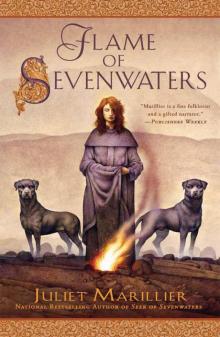 Flame of Sevenwaters
Flame of Sevenwaters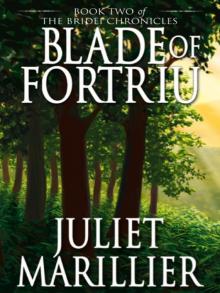 Blade of Fortriu
Blade of Fortriu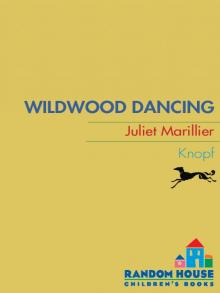 Wildwood Dancing
Wildwood Dancing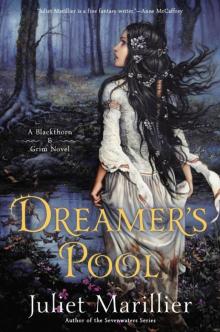 Dreamer's Pool
Dreamer's Pool Raven Flight
Raven Flight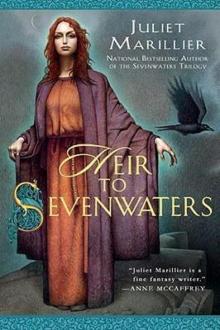 Heir to Sevenwaters
Heir to Sevenwaters The Dark Mirror
The Dark Mirror Daughter of the Forest
Daughter of the Forest Seer of Sevenwaters
Seer of Sevenwaters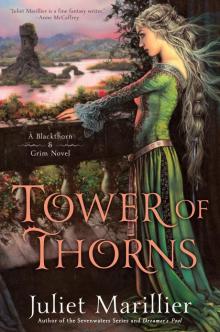 Tower of Thorns
Tower of Thorns Shadowfell
Shadowfell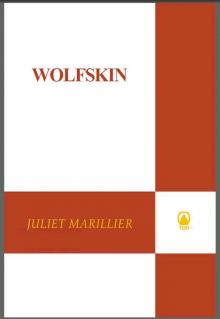 Wolfskin
Wolfskin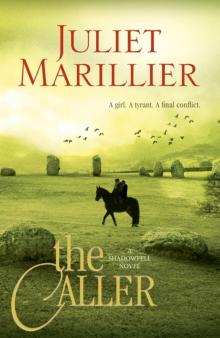 The Caller
The Caller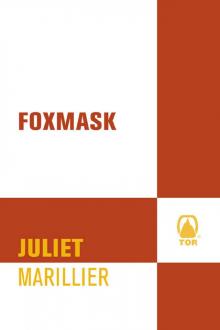 Foxmask
Foxmask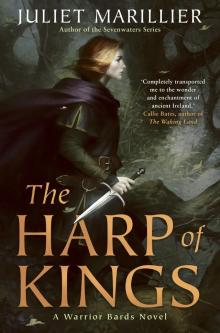 Harp of Kings
Harp of Kings The Well of Shades
The Well of Shades Heart's Blood
Heart's Blood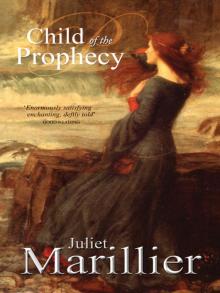 Child of the Prophecy
Child of the Prophecy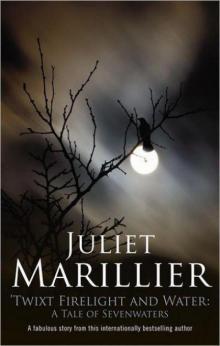 Twixt Firelight and Water
Twixt Firelight and Water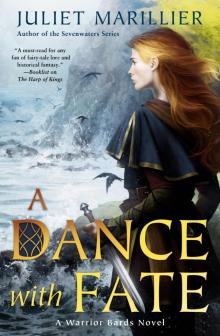 A Dance with Fate
A Dance with Fate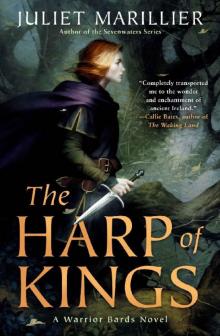 The Harp of Kings (Warrior Bards)
The Harp of Kings (Warrior Bards)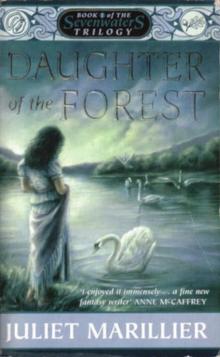 Daughter of the Forest (The Sevenwaters Trilogy)
Daughter of the Forest (The Sevenwaters Trilogy)![Sevenwaters [06] Flame of Sevenwaters Read online](http://i1.bookreadfree.com/i2/04/08/sevenwaters_06_flame_of_sevenwaters_preview.jpg) Sevenwaters [06] Flame of Sevenwaters
Sevenwaters [06] Flame of Sevenwaters![[Sevenwaters 04] Heir to Sevenwaters Read online](http://i1.bookreadfree.com/i2/04/12/sevenwaters_04_heir_to_sevenwaters_preview.jpg) [Sevenwaters 04] Heir to Sevenwaters
[Sevenwaters 04] Heir to Sevenwaters